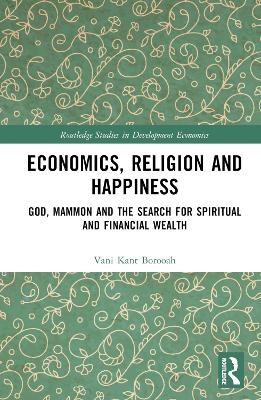
Economics, Religion and Happiness
God, Mammon and the Search for Spiritual and Financial Wealth
Seiten
2023
Routledge (Verlag)
978-1-032-37135-1 (ISBN)
Routledge (Verlag)
978-1-032-37135-1 (ISBN)
This book takes the view that happiness is not always within our control but, instead, prey to the attitudes and actions of others. Following Jean-Paul Sartre’s aphorism, “hell is other people”, the broad theme of this book is that “unhappiness is other people”.
Most books on happiness are concerned with answering, in their diverse ways, a basic question: how should I live? Such books assume, however, that the path to happiness lies entirely within one’s control. Happiness is simply a matter of doing certain things and refraining from doing certain other things. This book, however, takes a different view. It is that happiness is not always within our control but, instead, prey to the attitudes and actions of others. Following Jean-Paul Sartre’s aphorism, “hell is other people”, the broad theme of this book is that “unhappiness is other people”.
In the language of economics, “other” people, through their attitudes and actions, create externalities – often negative - which serve to make “us” unhappy. The instruments for creating such externalities are intolerance and feelings of envy/superiority. This book expands on this theme in respect of three areas: religion, money, and prejudice. It is fair to say the existing (un)happiness literature, particularly in economics, does not take many of these externalities into account. Instead, the focus is, firstly, on identifying the factors, internal to oneself, that contribute to personal happiness and, secondly, on measuring the relative strength of their contribution. By contrast, an analysis of the externalities that people impose upon others lies at the heart of this book.
Economics, Religion and Happiness will primarily appeal to students, academics and researchers across economics, psychology, philosophy, and sociology, and will also find an audience among those interested in exploring issues related to happiness in greater depth.
Most books on happiness are concerned with answering, in their diverse ways, a basic question: how should I live? Such books assume, however, that the path to happiness lies entirely within one’s control. Happiness is simply a matter of doing certain things and refraining from doing certain other things. This book, however, takes a different view. It is that happiness is not always within our control but, instead, prey to the attitudes and actions of others. Following Jean-Paul Sartre’s aphorism, “hell is other people”, the broad theme of this book is that “unhappiness is other people”.
In the language of economics, “other” people, through their attitudes and actions, create externalities – often negative - which serve to make “us” unhappy. The instruments for creating such externalities are intolerance and feelings of envy/superiority. This book expands on this theme in respect of three areas: religion, money, and prejudice. It is fair to say the existing (un)happiness literature, particularly in economics, does not take many of these externalities into account. Instead, the focus is, firstly, on identifying the factors, internal to oneself, that contribute to personal happiness and, secondly, on measuring the relative strength of their contribution. By contrast, an analysis of the externalities that people impose upon others lies at the heart of this book.
Economics, Religion and Happiness will primarily appeal to students, academics and researchers across economics, psychology, philosophy, and sociology, and will also find an audience among those interested in exploring issues related to happiness in greater depth.
Vani Kant Borooah is Emeritus Professor of Applied Economics at the University of Ulster, UK.
List of figures. List of tables. Preface. Setting the Scene. What Makes People Happy? Objective and Subjective Measures of Happiness. Religious Hatred and Religion-Based Violence. Income and Job Satisfaction. Prejudice. Conclusions. Index.
| Erscheinungsdatum | 10.10.2023 |
|---|---|
| Reihe/Serie | Routledge Studies in Development Economics |
| Zusatzinfo | 27 Tables, black and white; 12 Line drawings, black and white; 12 Illustrations, black and white |
| Verlagsort | London |
| Sprache | englisch |
| Maße | 156 x 234 mm |
| Gewicht | 620 g |
| Themenwelt | Geisteswissenschaften ► Psychologie ► Allgemeine Psychologie |
| Wirtschaft ► Volkswirtschaftslehre ► Ökonometrie | |
| ISBN-10 | 1-032-37135-8 / 1032371358 |
| ISBN-13 | 978-1-032-37135-1 / 9781032371351 |
| Zustand | Neuware |
| Informationen gemäß Produktsicherheitsverordnung (GPSR) | |
| Haben Sie eine Frage zum Produkt? |
Mehr entdecken
aus dem Bereich
aus dem Bereich
Techniken der Verhaltenstherapie
Buch (2024)
Julius Beltz GmbH & Co. KG (Verlag)
35,00 €


